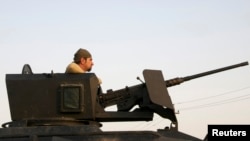Kurdish leaders cautioned Baghdad they will order their Peshmerga fighters to retaliate if Iraqi security forces launch any strikes on Kurdish-controlled territory.
The warning came after a weekend air raid on a town south of Kirkuk that left four people dead, including a 12-year-old child.
Tensions flared between semi-autonomous Iraqi Kurdistan and the central government following an announcement late last month by Kurdish leader Massoud Barzani threatening to hold an independence vote, opening the door to a breakup of war-wracked Iraq.
The referendum is being planned by the Kurds, who have long dreamed of forming their own independent state, in the face of opposition from the Iraqi government, which says it would be unlawful, and despite the disapproval of the Obama administration.
Iraqi officials insist that Sunday’s air raid on Tuz Khurmatu, 80 kilometers south of Kirkuk, was an error. They claim the army meant to strike a neighboring town occupied by jihadists who have been spearheading a Sunni insurgency in northern and western Iraq.
No going back
Tuz Khurmatu is not a Kurdish-majority town and is mostly Turkmen-populated but the Kurds now control it. After of the outbreak of the uprising by Sunni militants, the Peshmerga expanded south and east beyond the official borders of Iraqi Kurdistan to occupy territory historically claimed by the Kurds, ostensibly to keep it falling into the hands of Sunni insurgents.
But Kurdish leaders have made no secret of their determination to keep hold of the so-called “disputed territories”, including the oil city of Kirkuk. On June 28, Barzani announced defiantly that there would be no going back on autonomous Kurdish rule of Kirkuk. Successive Iraqi governments have refused to allow a referendum on the fate of the city, as allowed for under Article 140 of the country’s constitution.
“We waited for 10 years for Baghdad to solve Article 140,” Barzani said. “Now its accomplished because the Iraqi army pulled out and our Peshmerga forces had to step in. So now the problem is solved. There will be more no more conversation about it.”
Kurds suspect that Sunday’s air raid was Baghdad’s way of conversing and dismiss the Iraqi claim that the airstrike was a mistake. Workers from one of the Kurds’ two dominant political parties, the Patriotic Union of Kurdistan (PUK), say they suspect the warplanes were targeting their local office. Shalal Abdul, a town official, told the Kurdish news-site Rudaw that Peshmerga forces have repositioned themselves to be able to defend Tuz Khurmatu from either Sunni militants or the Iraqi army.
“The Peshmarga forces will not hesitate to retaliate against the next Iraqi assault on Kurdish positions,” said Jabar Yawar, the spokesman for the Peshmerga Ministry.
“This is the second time in less than a month that the Iraqi air force has targeted Kurdish Peshmarga bases and civilians,” he added in a press statement. In June, Iraqi army helicopters killed seven Peshmerga fighters and wounded 27 others during an attack near Saadiya in northern Diyala province.
Motivation
With anger mounting in Iraqi Kurdistan, Barzani accused the Shia-dominated Iraqi government of Prime Minister Nouri al-Maliki of implying that the Kurds are in league with Sunni militants in an effort to create turmoil and move toward independence.
“They have launched a deceitful campaign against the Kurds and they are using state money for this kind of propaganda,” he said in an open letter to the Iraqi people.
Prime Minister al-Maliki recently argued on Iraqi television that the Kurds were “part of a plot to divide Iraq.”
The Obama administration has urged the Kurds not to seize on the Sunni insurgency as an opportunity to seek independence. In June Secretary of State John Kerry visited Irbil, the capital of Iraqi Kurdistan, and urged the Kurds to throw in their lot with Baghdad and assist Iraqi forces against the jihadist-led Sunni insurgency sweeping Iraq.
Kurdish leaders have been careful to hint that the departure of al-Maliki and the formation of an inclusive Iraqi government may make them rethink their breakaway plans. With the exception of Israel and neighboring Turkey, which has signed a 50-year gas deal with the Kurds, governments in the region have warned the Kurds not to secede.
On Sunday, Egypt’s president, Abdel Fattah al-Sisi, was quoted by Egypt’s MENA news agency as saying it would be “the start of a catastrophic division of Iraq into smaller rival states.”
U.S. officials fear Kurdish secession will trigger wider sectarian fighting and fan the flames of regional conflict.
But with Iraq plunged into full-scale sectarian conflict, ordinary Kurds say they are becoming more determined to break free from the chaos and violence.
“Our time is now,” says 53-year-old Irbil stall-owner Salar. “Look around you. Our city is doing well, why shouldn’t we want to break away?”










